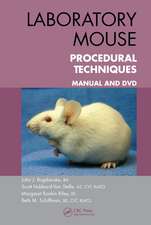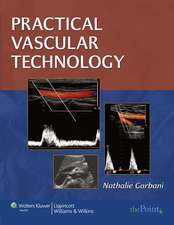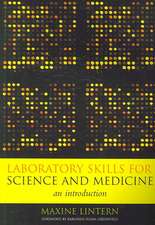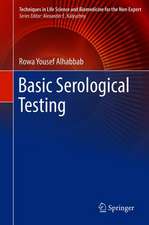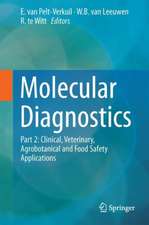Population Biobank Studies: A Practical Guide
Editat de Zhengming Chenen Limba Engleză Paperback – 11 dec 2021
Over the last two decades, several large biobank studies have been initiated in different populations, intended to greatly enhance the development of precision medicine. Contemporary biobank studies are extremely large and complex, and involve several decades of follow-up. Such studies pose major challenges in terms of ensuring rapid recruitment, obtaining high-quality data, minimisingloss to follow-up, reliably classifying disease outcomes, and optimising the use of the biological samples collected. In this regard, the key to success lies not in planning the perfect study, but in planning the most appropriate, reliable, sustainable and future-proof study given the practical constraints of available resources, time and capacity.
The authors of this handbook are epidemiologists, clinicians, software engineers, and laboratory and data scientists with extensive experience in conducting large biobank studies. The eight chapters can be read separately or together, and provide readers with essential information on how to design, implement and manage these studies. The state-of-the-art, innovative and scalable approaches and methodologies presented here are intended to stimulate the development of further population-based and hospital-based biobank studies in diverse populations.
| Toate formatele și edițiile | Preț | Express |
|---|---|---|
| Paperback (1) | 711.72 lei 6-8 săpt. | |
| Springer Nature Singapore – 11 dec 2021 | 711.72 lei 6-8 săpt. | |
| Hardback (1) | 856.43 lei 38-44 zile | |
| Springer Nature Singapore – 10 dec 2020 | 856.43 lei 38-44 zile |
Preț: 711.72 lei
Preț vechi: 749.19 lei
-5% Nou
Puncte Express: 1068
Preț estimativ în valută:
136.18€ • 142.57$ • 112.69£
136.18€ • 142.57$ • 112.69£
Carte tipărită la comandă
Livrare economică 05-19 aprilie
Preluare comenzi: 021 569.72.76
Specificații
ISBN-13: 9789811576683
ISBN-10: 9811576688
Ilustrații: XVIII, 202 p. 120 illus., 43 illus. in color.
Dimensiuni: 155 x 235 mm
Greutate: 0.32 kg
Ediția:1st ed. 2020
Editura: Springer Nature Singapore
Colecția Springer
Locul publicării:Singapore, Singapore
ISBN-10: 9811576688
Ilustrații: XVIII, 202 p. 120 illus., 43 illus. in color.
Dimensiuni: 155 x 235 mm
Greutate: 0.32 kg
Ediția:1st ed. 2020
Editura: Springer Nature Singapore
Colecția Springer
Locul publicării:Singapore, Singapore
Cuprins
1 Epidemiological studies: an overview of principles and methods.- 2 Design, implementation and management of biobank studies.- 3 Planning, organisation and management of fieldwork in biobank studies.- 4 Collection, processing, and management of biological samples in biobank studies.- 5 Monitoring long-term health outcomes of biobank participants by record linkages.- 6 Verification and adjudication of health outcomes in prospective cohort studies.- 7 Development and application of IT systems in biobank studies.- 8 Management and curation of multi-dimensional data in biobank studies.
Notă biografică
Zhengming Chen is a Professor of Epidemiology at the Nuffield Department of Population Health, University of Oxford, UK. He qualified in Medicine at Shanghai Medical University in China in 1983 and obtained a DPhil in Epidemiology from the University of Oxford in 1992. His main research focus has been on the determinants of chronic disease and advancement of evidence-based medicine. Since the mid-1990s, he has initiated and conducted several large prospective cohort studies and randomised trials of treatment for heart attack, stroke and cancer, yielding important findings that have since changed clinical practices and health policies worldwide. Most notably, he initiated, designed and co-directs, as the UK study PI, the China Kadoorie Biobank (CKB) study of over 500,000 adults, which has applied innovative approaches and methodologies for participant recruitment, data collection, quality assurance, study management and follow-up. He currently leads a large research teamin Oxford, with expertise in epidemiology, population health, genomic medicine, and data science.
Textul de pe ultima copertă
This book describes some of the key epidemiological principles, scientific approaches and quality assurance frameworks required to design and conduct biobank studies in various settings. Using examples from contemporary biobanks, the book addresses the design features and practical procedures needed in order to launch and manage biobank studies, including consent and regulatory approval, the organisation of field work, management of data and biological samples, follow-up and verification of disease outcomes, development of IT systems for data collection, quality assurance and study management.
Over the last two decades, several large biobank studies have been initiated in different populations, intended to greatly enhance the development of precision medicine. Contemporary biobank studies are extremely large and complex, and involve several decades of follow-up. Such studies pose major challenges in terms of ensuring rapid recruitment, obtaining high-quality data, minimising loss to follow-up, reliably classifying disease outcomes, and optimising the use of the biological samples collected. In this regard, the key to success lies not in planning the perfect study, but in planning the most appropriate, reliable, sustainable and future-proof study given the practical constraints of available resources, time and capacity.
The authors of this handbook are epidemiologists, clinicians, software engineers, and laboratory and data scientists with extensive experience in conducting large biobank studies. The eight chapters can be read separately or together, and provide readers with essential information on how to design, implement and manage these studies. The state-of-the-art, innovative and scalable approaches and methodologies presented here are intended to stimulate the development of further population-based and hospital-based biobank studies in diverse populations.
Over the last two decades, several large biobank studies have been initiated in different populations, intended to greatly enhance the development of precision medicine. Contemporary biobank studies are extremely large and complex, and involve several decades of follow-up. Such studies pose major challenges in terms of ensuring rapid recruitment, obtaining high-quality data, minimising loss to follow-up, reliably classifying disease outcomes, and optimising the use of the biological samples collected. In this regard, the key to success lies not in planning the perfect study, but in planning the most appropriate, reliable, sustainable and future-proof study given the practical constraints of available resources, time and capacity.
The authors of this handbook are epidemiologists, clinicians, software engineers, and laboratory and data scientists with extensive experience in conducting large biobank studies. The eight chapters can be read separately or together, and provide readers with essential information on how to design, implement and manage these studies. The state-of-the-art, innovative and scalable approaches and methodologies presented here are intended to stimulate the development of further population-based and hospital-based biobank studies in diverse populations.
Caracteristici
Focusing on the practical aspects of establishing biobank studies Covering issues on the development of study protocol and standard operating procedures Providing readers with an overall picture of practical issues in establishing, managing and using biobank studies for population and biomedical research




